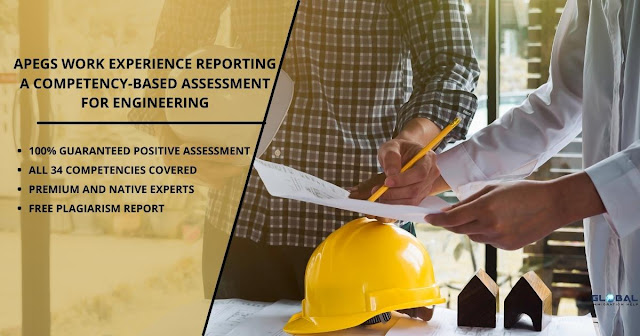APEGS Engineering Work Experience Reporting
If you are an engineer willing to settle down in Saskatchewan (Canada) and work there, then you have to go through an APEGS assessment. Now, you must be wondering what it is and how to have a successful assessment. Don’t worry this blog will give you a basic idea of the APEGS work experience reporting. So, read it with undivided attention.
Engineering
Work experience reporting (APEGS):
Before you apply for APEGS work experience
reporting, it is strictly advised to carefully read and
understand guidelines. This step will considerably improve the success chance
and lessen the re-submission risk. APEGS has started a new online Competency-Based
Assessment, also called CBA, an experience reporting system that came into
operation on January 01, 2019.
There is a system that is paper-based for engineers-in-training,
and it is only those engineers who are qualified to continue experience
reporting in the outgoing. For a Professional Engineer in the US with the latest
NCEES Records, then it is sufficient for academic documents, experience
reporting and references. There is not any requirement to submit experience
reports on the APEGS form if submitting NCEES Record.
It is advised to read the guide for Competency Assessment for
Assessors, Applicants and Validators. Apart from that, you should check out the
information on APEGS for CBA
Experience reporting Orientation presentation and online Competency-Based
Assessment system procedure.
The APEGS work experience reporting is necessary for an engineer
and geoscientist for evaluating, recording and validating engineering and
geoscience work experience. It makes it much easier for an applicant to
identify and fulfill the organization’s competency categories for registration
as a professional engineer and geoscientist.
First, you need to read properly the reporting guidelines
completely before you submit your work experience proof. It would considerably
improve the chances of a positive assessment.
Guidelines
and instructions or experience reporting:
A registered member-in-training and member-in-training candidate
(international candidate), told to have confirmatory exams, can start with the
experience reporting.
If having experience as a professional engineer in the US and also
have an NCEES record, then your NCEES record will be enough for experience
reporting. It means your NCEES record would be sufficient for APEGS form
submission, no experience would be required here.
Results of experience review are never provided to the candidate
over the phone; it is provided to them over email when they are ready.
Therefore, don’t contact the APEGS office to
know about the result. It would consume between 1 and 3 months of the experience
report review, and if any problem is found in the report, the candidate will be
contacted.
CBA
Report submission process:
There are three ways to submit the APEGS report to APEGS that are
given below:
·
Mailing the hard copy of documents and always
keeping a report copy if it doesn’t reach the APEGS Canada office.
·
Scanning the documents and sending a mail to experience-review@apegs.ca. The
scan was required to be of high quality and supported with a file size of less
than 5MB. Optimal quality is compulsory because APEGS Canada prints the taken
reports and scans them again in the small file sizer for the secure posting of
files shared for reviewers. Apart from that, if your supervisor scanned and
mailed the signed report to you, then it will be compulsory for you to print it
again for signature and again scanned it. After printing and scanning the
report for the third time, the quality of the report will become too low for
reviewers. Therefore, you are advised to send the original file over email.
·
APEGS Canada generally discourages faxing
reports as the quality is low and hard to read after it is scanned once more
for reviewers.
For the fresh, online CBA system (engineers-in-training only), all
information can be submitted through the online system.




Comments
Post a Comment